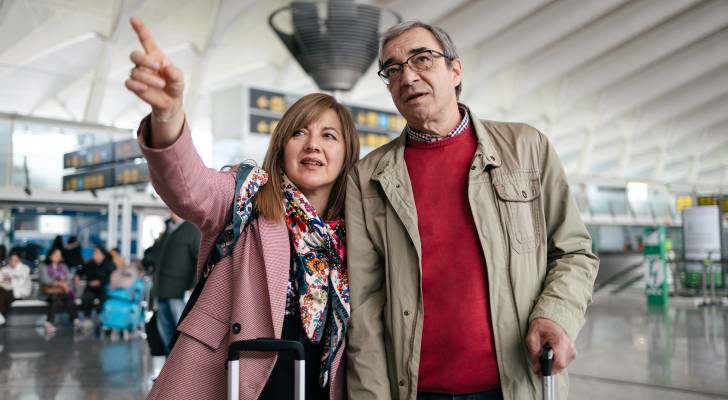
Trouble is brewing on the travel horizon. Once seen as a golden ticket to free flights and VIP perks, airline loyalty programs are leaving frequent flyers grounded.
Most airlines offer loyalty programs to encourage people to stick with the same carrier for most of their trips. These loyalty programs allow flyers to earn miles that can be redeemed to buy free flights. Traditionally, they’ve also offered perks like first-class upgrades, early boarding or line-skipping privileges and access to airline lounges.
Don’t miss
- I’m 49 years old and have nothing saved for retirement — what should I do? Don’t panic. Here are 5 of the easiest ways you can catch up (and fast)
- Gain potential quarterly income through this $1B private real estate fund — even if you’re not a millionaire. Here’s how to get started with as little as $10
- Thanks to Jeff Bezos, you can now become a landlord for as little as $100 — and no, you don’t have to deal with tenants or fix freezers. Here’s how
However, these programs have changed — and not for the better. Consumers are bearing the brunt of these changes.
So what’s shifting, and why are regulators paying attention? Here are some tips on how you can make the most of the existing programs and keep travel affordable, even if they don’t provide the benefits they once did.
Airline loyalty programs are losing value
A recent report from IdeaWorksCompany highlights just how much airline loyalty programs have declined. According to the report, the average cost of award seats on six major airlines has risen 36% since 2019, making miles worth far less. Airline mergers have also contributed to lost or devalued miles.
Earning miles has become less advantageous, too. Many airlines now base rewards and seat upgrades on total spending rather than miles flown — including purchases made with co-branded credit cards. In some cases, airlines have restricted benefits like lounge access and expedited service lines to only their biggest spenders.
These changes have been so dramatic that they caught the attention of the U.S. Department of Transportation (DOT) under the previous Biden administration. Then-Secretary of Transportation Secretary Pete Buttigieg sent a letter to American Airlines, Delta, United and Southwest requesting detailed reports about their loyalty programs.
The DOT stated that it "launched an inquiry into the four largest U.S. airlines’ rewards programs that is aimed at protecting rewards customers from potential unfair, deceptive, or anticompetitive practices," adding that the "DOT’s probe is focused on the ways consumers participating in airline rewards programs are impacted by the devaluation of earned rewards, hidden or dynamic pricing, extra fees, and reduced competition and choice."
One concern raised by the DOT is that travelers who have spent years saving up miles for a dream trip may now find those miles have lost significant value.
However, it’s worth noting that this inquiry began under the Biden administration. With the transition to the Trump administration, there’s skepticism about whether those protections will remain. Some worry that recent rules requiring transparency around fees and timely refunds for cancellations or major flight changes may be rolled back.
As Frommer‘s pointed out, the new Secretary of Transportation, Sean Duffy, is a former airline lobbyist. A major airline lobbying group even said it was "thrilled" with his nomination. As a result, there’s concern that the probe into loyalty programs may stall or be abandoned entirely.
Read more: Car insurance premiums could spike 8% by the end of 2025 — thanks to tariffs on car imports and auto parts from Canada and Mexico. But here’s how 2 minutes can save you hundreds of dollars right now
How to make the most of your loyalty program
If you’re enrolled in a loyalty program and you want to make the most of it, here are a few smart strategies:
- Evaluate co-branded credit cards: These cards can offer extra loyalty points on everyday spending, but make sure the benefits outweigh the annual fee and any restrictions.
- Read the fine print: Know the terms and conditions of your loyalty program so you understand what you’re entitled to — and what’s changed.
- Use your miles sooner rather than later: Programs can change quickly, so if you have enough points for a trip, consider redeeming them before their value drops.
- Learn how to transfer points: Some loyalty programs allow you to transfer or pool miles with partners. This flexibility can help you access more flight options and redeem rewards faster.
These tips can help you get more value from airline loyalty programs — even if they’re not as generous as they once were. And if you find that airline-specific rewards aren’t meeting your needs, consider exploring general travel credit cards. Many offer bonus rewards and discounts on travel purchases, without being tied to a single airline.
If you’re a frequent traveler, it’s worth taking the time to research your options so you can continue earning rewards, save money and visit more places.
What to read next
- Want an extra $1,300,000 when you retire? Dave Ramsey says this 7-step plan ‘works every single time’ to kill debt, get rich in America — and that ‘anyone’ can do it
- Here are 5 ‘must have’ items that Americans (almost) always overpay for — and very quickly regret. How many are hurting you?
- There’s a 60% chance of a recession hitting the American economy this year — protect your retirement savings with these essential money moves ASAP (most of which you can complete in just minutes)
This article provides information only and should not be construed as advice. It is provided without warranty of any kind.